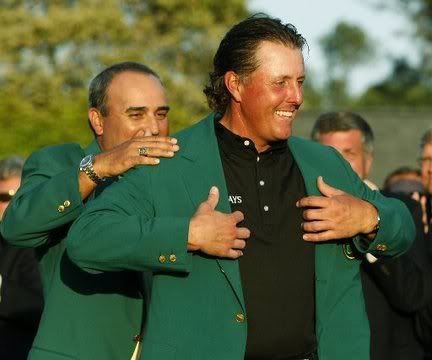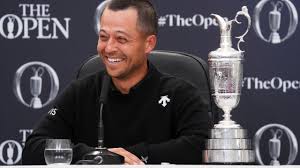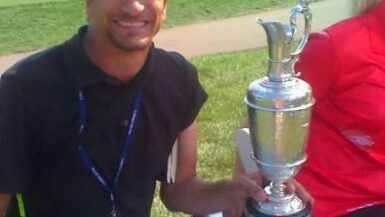
Arms raised in exaltation and the pines ringing with the cheering, a victorious Phil Mickelson, The People’s Champion, closed out the 74th Masters with his second consecutive 5-under round of 67 and donned his third green jacket.
The victory washed away the major disappointment from his 2006 U.S. Open collapse at Winged Foot, and brought the focus of the PGA Tour back to world-championship caliber golf rather than the myriad scandals that rocked the life of a testy, terse, and barely-sincere-sounding Tiger Woods. As fellow Golf Observer columnist David Barrett noted, “While Woods was welcomed back into the world of golf with some hesitation, Mickelson was welcomed back into the winner’s circle with universal acclaim.” Mickelson joins Jimmy Demeret, Sam Snead, Gary Player, and Nick Faldo as the only players to win the Masters three times. Only Jack Nicklaus (6), Woods (4), and Arnold Palmer (4) have more career wins at the Masters.
Mickelson’s card on Championship Sunday was impeccable: five birdies, no bogeys, perfectly clean. He finished the tournament 16-under par. England’s Lee Westwood, the number 4 player in the world, finished second at 13-under after an up-and-down 71. Popular wunderkind Anthony Kim fired a sparkling 65 to vault into third place at 12-under, while K.J. Choi and Tiger Woods, who played together all four days, finished T-4 at 11-under.
Nevertheless, in typical Mickelson fashion, there was white-knuckle drama that kept golf fans across the country riveted with suspense. Living up to his reputation as daring, aggressive “Phil the Thrill,” Mickelson drove all over the map, hit shots from between trees, got up-and-down from the deck of a sinking ship, missed a laughably short putt, made many long ones, and gave his countless fans coronaries with each of his mercurial exploits.
“It’s never easy with him. He has to give us a heart attack,” exclaimed sports writer Tony Korologos.
“He’s always trying something outrageously risky. And every time he gets away with it, he tries something even crazier,” agreed golf fan Jeanne Capraro. “But the things he pulls off are unbelievable.”
Indeed, the defining moment of the tournament was vintage swashbuckling Mickelson: a birdie at the iconic par-5 13th that was anything but routine for the short, but dangerous hole. Struggling with the driver throughout the day, he drove into the woods left of the fairway, behind two trees.
“I saw from the look in his eye he was going to go for it, and I said ‘Oh no, he’s going to do something stupid,” said one prominent reporter from a major newspaper.
“Something stupid” in this case was hitting a 200-yard 6-iron off an unpredictable lie (pine needles) between a gap in two trees the size of a stick of Juicy Fruit gum to a pin tucked just in front of Rae’s Creek with the Green Jacket in the balance. Crazier things have been reported, but not by reliable sources.
“I had a good lie in the pine needles. I was going to have to go through that gap if I laid up or went for the green,” Mickelson explained. “The gap wasn’t huge, but it was big enough, you know, for a ball to fit through,” he finished mischievously. The media center erupted in laughter.
The gap was really about four or five feet wide, but with the Masters on the line, that’s a lot smaller and more intimidating than when you’re playing your lunkhead golf buddies for a $5 Nassau…even with automatic presses. Every golf fan in America held its collective breath. This was exactly the kind of temporary insanity that has come to define Mickelson.
He hit it to three feet. Sink a plaque there to commemorate the shot. Now it’s history.
He strode up the fairway to an ovation worthy of a rock star. The applause rose like a storm, and then echoed throughout the trees for two full minutes. It was sheer adoration.
And then he missed the putt. Typical Mickelson.
“Idiot!” snarled Capraro, saying what everyone else was thinking.
But unlike Shinnecock, Bethpage, and Winged Foot, missing the shorty didn’t prove fatal. Phil finally cured his driver woes, and with a birdie at the par-5 15th, opened up the three shot lead he would eventually take to the clubhouse.
Still, it was the bold, seemingly miraculous recovery and birdie at 13 that was one of two defining shots of the tournament for Mickelson. (The other was the stunning hole-out of his approach shot at 14 on Saturday for eagle which was part of an eagle-eagle-birdie run which catapulted him to the top of the leaderboard and positioned him for Sunday’s magic.) When asked later what was the difference between a great shot and a smart shot, Mickelson puckishly replied, “A great shot is when you pull it off. A smart shot is when you don’t have the guts to try it.”
Bold, daring shots such as Mickelson’s also define the Masters. Temptation is the soul of golf and few tournaments in the world have that razor’s edge of all-or-nothing like The Masters. The line between eagle and double bogey coming down the stretch at the Augusta National is gossamer thin. Players can skyrocket up or plummet down the leaderboard in an instant. Usually, as Dan Jenkins wrote, driest ball wins.
“There’s a lot more birdie holes on the back nine than there are the front,” explained Mickelson. “If I can make the turn at under par, I feel like there’s a 3- or 4-under par round on the back, and that’s where the round really happens is the back nine,” he affirmed. “Westwood and I were walking up 8 green marking our balls and looked up on the leaderboard and we both said, “Let’s join this party.” Everybody is having fun, making birdies, making eagles, let’s get in it. Let’s do it, too.'”
That’s why the Masters is the most beloved tournament in golf. If you want to win the Masters, you have to go out and take it. That’s what it takes to win at Augusta. The Masters is not the U.S. Open: You go out and win the Masters, it doesn’t win you.
In particular, players must take advantage of the scoring opportunities at 13-14-15, a short par-4 sandwiched between two short but dangerous par-5s guarded by Rae’s Creek. This year while the stretch of 10-11-12 ranked 3rd, 2nd, and 9th in terms of difficulty, 13-14-15 played as the 16th, 7th, and 17th hardest holes on the course. In tournament history all time (1942-2009) 10-11-12 rank 1st-3rd-2nd in difficulty, while 13-14-15 rank 17th-8th-18th. At Augusta, you survive 10-11-12, you charge at 13-14-15. On the weekend, Mickelson played the stretch of 13-14-15 in 7-under par. Indeed, there were more back nine scores of 34 and under this year than there were in any tournament since 2002. Headline: pros light it up at a major, world doesn’t end.
Mickelson also won because he played the par-5s 12-under for the week. If you want to win the Masters, you have to take advantage of the par-5s, all four of which are the best scoring opportunities on the course. And that means you’re going to have to challenge Rae’s Creek and some tight pins.
“Oh no he’s doing something stupid again?” No, he was doing something special again, but that’s why the fans love him. Their hearts are in their throats every time. One minute its “Phil!” and the next it’s “Phil?? %$#@!” Sometimes he’ll hit it to two feet, and sometimes he’ll hit the chamber with the bullet in it. But that’s why we love him. He’s the most exciting and accessible champion in golf.
NEWS AND NOTES
Mickelson finished T-43 in driving accuracy, proving true the old adage that Augusta National is a second shot golf course. In fact, none of the top five players on the leaderboard were in the top 20 in driving accuracy.
Greens in regulation was a different story altogether. Westwood finished first, hitting 58 of 72 for 80.5%. Mickelson was T-3, (54 of 72, 75%), Anthony Kim was T-9, (51 of 72, 71%).
For those that insist the PGA Tour needs Tiger Woods to increase excitement and accessibility to the casual fan, I submit the following list of this year’s tournament winners: Geoff Ogilvy, Ernie Els, Jim Furyk, Anthony Kim, Camilo Villegas, Ian Poulter, Ryan Palmer, Steve Stricker, and Phil Mickelson. Combined, they own a total of nine major championships. The New York Yankees don’t field as many all-stars.
The reviews on Tiger Woods’s return were mixed at best. After an opening 68, his golf was rusty. When he was great, he was epic – tying the tournament record for eagles in one Masters (4) and, in particular, holing out an 8-iron on the 7th for a deuce yesterday. When he was bad, it was comical: pop-ups and flares and tree branches. But what hasn’t changed is his belief he’s entitled to slam clubs and swear with impunity.
“I think people are making way too much of a big deal of this thing. I was not feeling good. I hit a big snipe off the first hole and I don’t know how people can think I should be happy about that,” Woods admitted after the round. “I hit a wedge from 45 yards and basically bladed it over the green. These are not thinks I normally do. So I’m not going to be smiling and not going to be happy.”
Fans did not respond well to his comments. “He has no business acting like that,” seethed life-long golf fan Jean Gmerek. “He’s not going to win back fans or sponsors if he still acts like rules don’t apply to him. I don’t like the duplicity in him throwing clubs, swearing and act as thought rules don’t apply to him and then turning around and telling us that he changed and more respectful of the game. That’s why Phil is the true fan favorite. We marvel at Woods, but we embrace Phil because he embraces them back and doesn’t just take the game for all he can get while giving nothing back.”
On the same note, Golf Observers David Barrett made similar comments. “It would be hard top this victory, though, as it came at the first tournament Amy [Phil’s wife] was able to attend since starting treatments for cancer last May. That made it an emotional win, as well as a highly popular one among fans. In popularity among fans, Phil is first. That was really driven home this week, with Mickelson’s touching family saga contrasted with Woods’s sordid scandal.”




